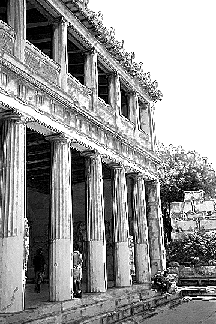 Fall 2001
Fall 2001
Course Description
This course has been selected to represent historical analysis in our core curriculum,
and thus will pay close attention to the workings of history. Students will confront a variety
of problems in historical interpretation, and will be required to find their own individual approaches and solutions.
We will discuss continuity and causes of change from the early Greek period to Classical Athens to
the period of Hellennistic kings and on to the Roman republic and empire. We will discuss if, and in what ways,
the ancient world progressed; the growth of literacy and its impact; and the development of historical self-consciousness
in the context of the numerous and varied documents that Greece and Rome have left us.
We will work through
more than a millennium chronologicaly as we discuss a variety of ancient values
relating to the central topics of war, rhetoric,
the gods, and law as well as mass culture, sexuality, and whatever else interests the class.
We will see some stunning changes throughout
our periods, as well as some unexpected continuity, probably with many of us
disagreeing with each other as we go. Such disagreement will lead to a more stimulating
experience of history, and perhaps to a richer perspective on our own values.
1) evidence of serious thought on their chosen argument/problem
Course Requirements
Grading
Texts
Policies
Course Description:
Most historians agree that the foundations of
many facets of modern life were laid in ancient Greece and Rome. In the field of politics,
representational government originated in Greece and developed into republican
institutions in Rome. Intellectually the ancient mediterranean gave us almost
every field we recognize today from literature to philosophy, natural science
to communications. In religion Greece left a rich tradition of pagan cults,
and the Roman world brought us the two most
influential religions of the modern world, Christianity and Islam. This course will
attempt to understand some of the complex forces that shaped ancient culture. But rather
than dwell on wars, political maneuvers, philosophical subtleties, literary artifice,
or artistic achievement, we will ponder the values of ancient Greeks and Romans, how
they were formed, and how in turn they helped form the many institutions still familiar
to us today.Course Requirements
This course is intended to stimulate thought, and thus the first and most difficult requirement is
to think. This thinking will best be directed towards the readings so students will be expected to
read carefully all of the selections and be prepared to discuss them in class. In order to give
structure to the reading and discussion eash student will propose a provisional system of values
on Sept. 18 (2-3 pages). By the end of the semester each student will have revised and refined
this system into essay form and turn this in as her paper (10 pages, double-spaced, 12 point font,
1 inch margins) for the course. There will also be two tests given to help studtents to synthesize
the material of the course.Grading
2) clarity of proposed argument/analysis/system
2) command of the appropriate reading (or whatever evidence is applied)
3) ability to draw in other sources to the discussion
4) command of general history surrounding the specific problem
5) familiarity with the class discussion
6) persuasiveness of argument
7) synthesis of specific problem into the broader issues of Greek and Roman values
8) originality or at least attempted originalityAssignments (some of these links can only be accessed on campus):
back to beginning
Texts
back to beginning